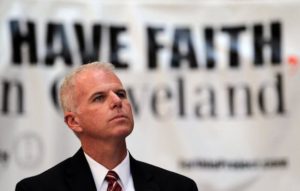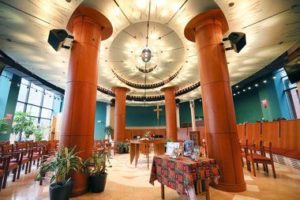J. Bennett Guess: Saying Farewell to UCC’s National Headquarters, Not Its Impactful Mission
After 17 years as a church bureaucrat, I’m moving on.
I joined the United Church of Christ’s national offices, along with 100 new hires, in the summer of 2000. It was a time of great anticipation.
“Restructure” — with a capital “R” — had just concluded after a 10-year exhaustive process, overcoming massive legal and ecclesiastical hurdles to successfully merge 11 fiercely autonomous church agencies into four Covenanted Ministries.

The Rev. Dr. J. Bennett Guess
Finally, we said, there would be alignment in the national UCC’s mission and purpose, with evenly distributed resources and equitable salaries, a shared HR department, all led by a “Collegium of Officers,” a collaborative top-executive leadership model intended to show the world what a non-hierarchical church structure could look like.
Architecturally, multiple ceremonious ribbons were cut. The long-envisioned “Church House” campus was coming together beautifully in downtown Cleveland, including a brand-new 140-room Radisson Hotel; the inspiring Amistad Chapel; and a modernized nine-story former-AT&T office building. Millions of dollars were spent to ready the church, its facilities and staff for an exciting new era of missional growth with collaborative intentionality.
With nearly 300 employees, our all-staff gatherings were held in the spacious chapel, still not quite large enough for so many people. We sang really, really well, and we were impressively diverse — racially, ethnically, and theologically — with many languages spoken. A Pentecost experience for this Kentucky white boy, for sure. I was living in Oz.
I gave myself fully — heart, soul, mind and body — to this new-era moment, believing fervently that we could bridge every divide, break down every silo, and usher in such incredible moments of deep human-divine connection that, finally, the radically progressive church would be the talk of all the major news shows.
Over the years, I experienced many phenomenal moments, and the number of amazing, courageous, justice people I have met is beyond counting. We welcomed hundreds of new congregations into the UCC, and received thousands of new people who previously thought an inclusive church like ours did not exist. The UCC’s “God is still speaking” campaign took to television, radio and internet, with a message of radical inclusivity that, sadly, too few people had ever heard before from a Christian organization.

Amistad Chapel opened in 2000 at the UCC’s national “Church House” in downtown Cleveland.
We named and confronted systemic racism, as the UCC has always done. We stood shoulder-to-shoulder with scapegoated Muslims, low-wage migrant farmworkers, Dakota water protectors, and victims of a broken criminal justice system. We led the way for marriage equality, for comprehensive sexuality education, for HIV/AIDS education, and for low-income housing. We advocated fiercely for public education, voting rights, the rights of the differently abled, and the environment — issues that many don’t see as pressing religious concerns. We do.
We’ve insisted the gospel is always global and communal, not just local and personal. We attended to strengthening partnerships around the world and have responded generously during — and long after — multiple wars, conflicts and natural disasters.
The Church House in Cleveland has truly been a “home” — a symbol of hope, justice and resistance — for many people, most especially me. I am very proud and grateful to have played a small role in that long and rich continuum that is the United Church of Christ (and its predecessor denominations), a mission of oneness that began long before me and will continue long after, in equally exciting and impactful ways.
But over these same 17 years, things have changed in ways that I and others never anticipated. We’ve seen constant reductions in force, down to 120 staff now, a shadow of our former selves. We have lost nearly 500,000 members nationally, from 1.4 million then to about 900,000 now.
Our hotel is up for sale, two floors of offices await outside tenants, and the chapel sits empty more often than it is used, because we no longer bring together hundreds of visitors weekly like we once did. Budgets are smaller, and ways of gathering and staffing are changing. We still talk about the need to build trust and break down silos, as much as ever.
Yet, to be clear, our reality is not unlike the Southern Baptists, Presbyterians, Episcopalians, or the VFW, Lions and Rotarians. Even Optimist Clubs seem less optimistic these days.
We’re caught in a downward spiral that all once-formidable membership organizations are experiencing, no matter their political or religious bent. Joining, just for the sake of joining, is no longer in vogue.
So, as I’ve been wrapping up and reflecting on my time here, I find myself thinking about clay pots — earthen vessels — the kind that St. Paul wrote about in 2 Corinthians.
“For what we preach is not ourselves, but Jesus Christ as sovereign,” he writes. “For we have this treasure in earthen vessels to show that the transcendent power belongs to God and not to us.”
Or, as I might phrase it:
“For what we preach is not measured by our ability to will it so, but persists as ever-resurrecting love and truth.”
We are imperfect people committed to building a more-perfect world, and that’s enough to get me out of bed most mornings. But the good news is that God’s work in the world doesn’t depend on how I happen to feel about it on any given day.

The UCC’s 400 health and human service ministries provided $857 million last year in uncompensated, charitable care.
This past year, the UCC’s 400 health and human service ministries — with which I’ve been privileged to work during my final year at the Church House — provided $857 million in uncompensated charitable care, up from $728 million the year before and way, way up from $30 million in 1987. These programs, communities and institutions — large and small — touch more than one million lives every year through direct service, advocacy and compassionate care.
These are the kind of numbers — and the kinds of stories — the UCC is increasingly compiling and sharing to convey our impact. It’s a far better indicator, in my opinion, than the number of office chairs we own.
Soon, I’ll be taking on a new role as executive director of the ACLU of Ohio, but I’ll still be an ordained UCC minister, lugging around my own little clay pot of vulnerable good intentions, working to make this world a better, more inclusive place.
I’m not sure how my toil, or yours, will be counted in the ultimate tally, but I do trust that we all contribute to the grand sum that is the gospel, no matter how vainly we try to measure it. The UCC’s prophetic justice witness will always be my own.
The Rev. Dr. J. Bennett Guess, departing CHHSM Vice President, is a former executive minister and national officer of the UCC, where he also served as director of communication and news director, among other roles. Prior to joining the UCC’s national offices, he was a local church pastor in western Kentucky for 12 years. In July, he will become executive director of the American Civil Liberties Union of Ohio.
Join Our Mailing LIst
"*" indicates required fields
Follow on Facebook
Pension Boards appoints David A. Klassen as its President, CEO - United Church of Christ
www.ucc.org
The Pension Boards, an affiliated ministry of the United Church of Christ recently announced its appointment of David A. Klassen as its next President and